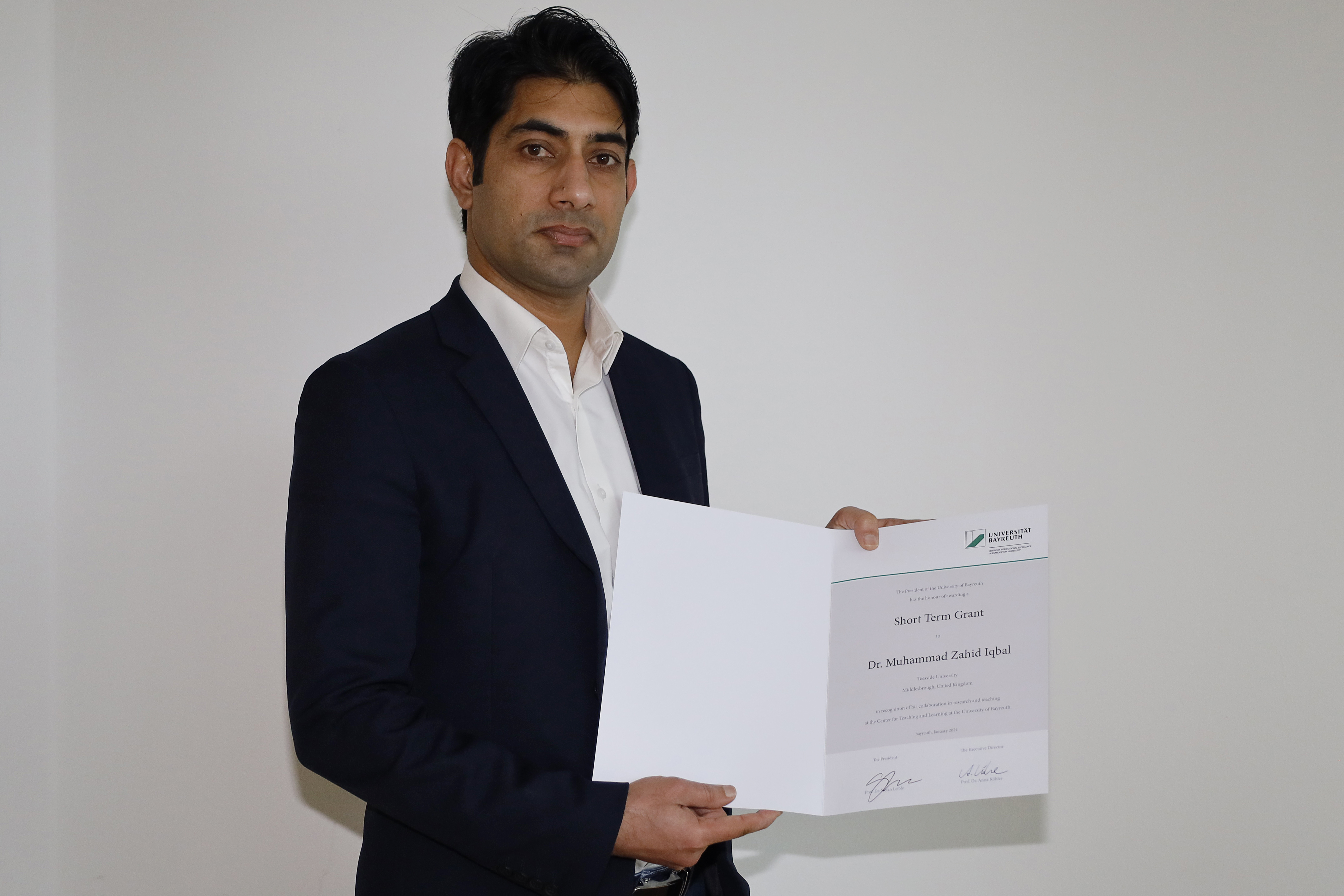Meet the Grantee: Dr. Muhammad Zahid Iqbal
Investigating Potential of Extended Reality(XR) for Enhancing Pedagogical Practices in Higher Education
Our Short Term Grantee Muhammad Zahid Iqbal was involved in a thrilling endeavour: the XR-CAMPUS project at the Centre for Higher Education Teaching (ZHL) hosted by Dr. Frank Meyer. For him, receiving the BHC grant was like standing at the threshold of a grand adventure, ready to embrace every twist and turn along the way. Indeed, the Grant fully met his expectations and he had a highly productive and inspiring time at UBT.

Dr. Muhammad Zahid Iqbal (Photographer: Peter Kolb)
If you had to explain the research project of your Short Term Grant to the person you metin the elevator, how would you describe it?
Muhammad Zahid Iqbal:
I was a visiting researcher for the XR-CAMPUS project at the Centre for Higher Education Teaching (ZHL). This project focused on investigating the use of immersive technology in higher education contexts. This exciting initiative aims to integrate virtual and augmented reality into higher education teaching and learning. The goal is to effectively apply these technologies for immersive learning experiences through three-dimensional visualizations and collaborative reflection with students.
The project team aims to create didactically considered formats and scenarios using virtual realities and enriched teaching materials, including 3D, VR, AR, and XR. By integrating XR into analog teaching formats, they hope to enhance the learning experience for students. The potential to transform traditional educational methods through immersive technology is immense, and being part of this pioneering project has been a remarkable opportunity to contribute to the future of higher education.
What does international research mobility in today's world mean to you?
MZI: For me, international research mobility represents a thrilling journey across borders, both physical and intellectual. International research mobility allows scholars, scientists, and students to transcend geographical limits. It's like stepping onto a global stage where knowledge knows no borders.
We venture into new academic landscapes, collaborate with diverse minds, and explore uncharted territories of thought.
Mobility is not just about research—it's about cultural immersion. These experiences enrich our perspectives, break stereotypes, and foster lifelong friendships. Collaborative projects thrive when minds from varied backgrounds converge. Mobility teaches adaptability. We navigate language barriers, adjust to climates, and find comfort in discomfort.
What was your personal experience during your stay?
MZI: My one-week research stay at the University of Bayreuth was an enriching and memorable experience. The city's charm captivated me with its picturesque landscapes and vibrant cultural scene, making it a delightful place to explore. The friendliness of the people was particularly striking, as they were always welcoming and eager to assist, creating a warm and inclusive atmosphere. The university's campus was impressive, combining modern facilities with beautiful green spaces that fostered a conducive environment for academic pursuits and relaxation. Additionally, the clean and well-maintained surroundings contributed to a pleasant and inspiring setting for research. Overall, my time at Bayreuth was highly productive and enjoyable, leaving me with a deep appreciation for the university and its community.
What were your expectations when you applied for the Grant?
Did you have specific goals in mind, something you were hoping to achieve?
MZI: When I applied for the grant, my expectations were a mix of excitement, hope, and determination. I envisioned a world of possibilities opening up—a chance to delve into meaningful research, collaborate with brilliant minds, and contribute to something larger than myself. The grant represented an opportunity to turn ideas into reality, explore uncharted territories, and make a positive impact. I eagerly anticipated the challenges, the late nights fueled by curiosity, and the joy of discovery. It was like standing at the threshold of a grand adventure, ready to embrace every twist and turn along the way.
If you could choose a famous researcher or scientist to have dinner with, who would it be?
MZI: As a researcher in immersive technology, I would be thrilled to have dinner with Mark Billinghurst, a pioneering figure in the field of augmented reality (AR) and human-computer interaction. His extensive work in developing intuitive AR interfaces and his innovative contributions to the wearable computing space have significantly influenced contemporary immersive technology practices. Discussing his insights and experiences could provide invaluable perspectives on the evolution and future directions of AR and virtual reality (VR). Moreover, his interdisciplinary approach, combining elements of computer science, design, and cognitive psychology, aligns closely with my interests and research goals. Engaging with him could inspire new ideas, foster potential collaborations, and deepen my understanding of how immersive technologies can be harnessed to enhance human experiences and interactions.
